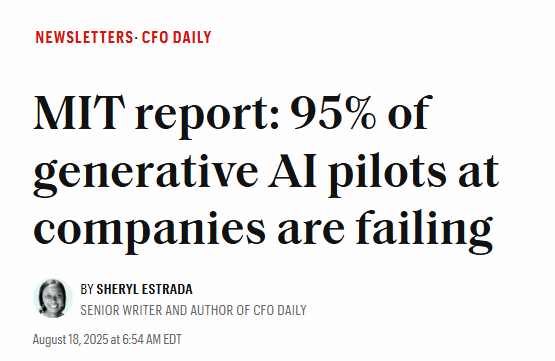AI Governance is the “make or break” for successful AI implementation

I’ve claimed so many times that GenAI will break the productivity paradox* since it is creating broad intelligence as well as democratizing and lowering entry barriers to use the technology. Many of us expect GenAI to become a new General-Purpose Technology*, GPT. Yet, the last and most crucial wave for a technology to be defined as a GPT “…involves the profound transformation of established practices, new business models, and widespread innovation, as the technology becomes deeply embedded in the economic and social fabrics. “
This leads us to the recent MIT study’s finding that 95% of AI pilots fail to deliver ROI.
The study suggests that successful AI projects often have direct CEO or C-suite oversight, embedding AI within strategic priorities rather than siloed experimentation. Since 2018, Asenion has worked with organizations to break down the silo of the tech functions in order for compliance and business functions to align and comprehend the ROI based on both the business value as well as the risks and regulatory requirements. What we found is that executive teams fail to make the right strategic moves due to lack of ROI calculated from an integrated tech, risk/compliance and business perspective.
But with this study, I hope that these times are over. Need I say it? The missing link is AI Governance. AI Governance is a prerequisite for AI innovations and commercialization. The MIT Study underscores a critical and urgent need for robust AI governance within organizations. The high rate of failure is not due to the inherent limitations of AI technology, but rather to organizational shortcomings—particularly a lack of understanding about how to effectively integrate AI into business workflows, set clear objectives, and manage risks. Without AI Governance, organizations risk introducing operational, reputational, and regulatory pitfalls. AI Governance establishes protocols for managing data privacy, ethical concerns, and compliance, which are vital as AI adoption scales.
Yet, at the moment the AI Governance tools are fragmented, unsynchronized, time consuming and costly. Policy, engineering, compliance and leadership teams work in silos.
This is my advice to start your AI Governance journey:
- Assign accountable persons/functions for AI Governance
- Apply a framework for standardizing cross-functional orchestration
- Implement an AI Governance platform for systematic support
- Produce Key Risk Indicators as well as ROI measures.
The Path Forward
AI governance must become a foundation of enterprise strategy, with focused leadership, rigorous evaluation, and continual adaptation. Without it, AI investments are likely to result in the same “pilot purgatory” and wasted resources highlighted by the MIT study. For organizations seeking real returns, systematic governance is not optional—it is essential for transforming experimental AI into real, scalable business value
Anna Felländer, co-founder and president Asenion Europe
* The observed disconnect where investments in new technologies, particularly information technology (IT), do not lead to the expected increases in productivity.
* A General Purpose Technology (GPT) is a significant invention that fundamentally changes economic and social structures by enabling numerous new applications across various industries and creating a ripple effect of innovation and growth.

